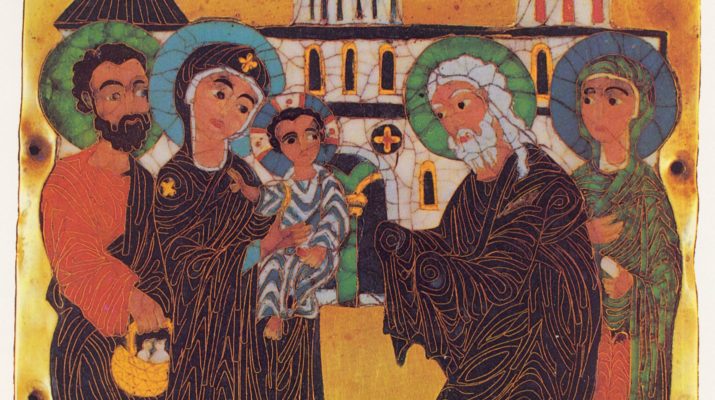Luke 2:25-32
NL 215
A {untranslated} = idou. From eido (to be aware, see, know, remember, appreciate). This is see! Lo! Behold! Look! Used to express surprise and or draw attention to the statement.
B “was” = eimi. This is to be, exist.
C “man” = anthropos. Probably from aner (man, male, husband) + ops (eye, face); {from optanomai (to appear, be seen); perhaps from horao (become, seem, appear)}. This is human, humankind. Used for all genders.
in JerusalemD whose nameE was Simeon;F
D “Jerusalem” = Ierousalem. From Hebrew Yerushalaim (probably foundation of peace); {from yarah (to throw, shoot, be stunned; to flow as water so figuratively to instruct or teach) + shalam (to make amends, to be complete or sound)}. This is Jerusalem, dwelling of peace.
E “name” = onoma. May be from ginosko (know, recognize, learn from firsthand experience). This is a name, authority, cause, character, fame, reputation. The name was thought to include something of the essence of the person so it was not thought to be separate from the person.
F “Simeon” = Sumeon. 7x in NT. From Hebrew Shimon (Simon – Jacob’s son and his tribe); from shama (to hear, often implying attention and obedience). This is Simeon, Symeon, or Simon. It is a personal name as well as the tribe Simeon. It means “he who hears.”
this man was righteousG and devout,H looking forward toI the consolationJ
G “righteous” = dikaios. From dike (the principle of justice; that which is right in a way that is very clear; a decision or the execution of that decision; originally, this word was for custom or usage; evolved to include the process of law, judicial hearing, execution of sentence, penalty, and even vengeance; more commonly, it refers to what is right); may be from deiknumi (to show, point out, exhibit; figurative for teach, demonstrate, make known). This is correct, righteous, just, or a righteous person. It implies innocent or conforming to God’s standard of justice.
H “devout” = eulabes. 4x in NT. From eu (good, well, well done, rightly) + lambano (active acceptance/taking of what is available or what has been offered; emphasizes the choice and action of the individual). This is literally handling well or grasping what is good. So, cautious or circumspect. By extension, it refers to devout, pious, or God fearing
I “looking forward to” = prosdechomai. 14x in NT. From pros (at, to, toward, with) + dechomai (to warmly receive, be ready for what is offered, take, accept, or welcome; to receive in a literal or figurative sense). This is to receive, welcome, expect, accept. It is reception with a warm, personal welcome or active waiting. It can also mean endurance or patience.
J “consolation” = paraklesis. From parakaleo (to call to, summon, invite, request, or beg; to exhort or admonish; to encourage, comfort, or console; has legal overtones and is used of one’s advocate in a courtroom); {from para (beside, by, in the presence of) + kaleo (to call by name, invite, to name, bid, summon, call aloud); {related to keleuo (to command, order, direct); from kelomai (to urge on)}}. This is calling someone for help, a personal exhortation, comfort, encouragement, joy, entreaty, urging. This word comes from a legal setting – as bringing evidence to advocate for another in court. This word is related to the word “Advocate” or paraclete used for the Holy Spirit.
of Israel,K and the HolyL SpiritM restedN on him.
K “Israel” = Israel. From Hebrew Yisrael (God strives or one who strives with God; new name for Jacob and for his offspring); {from sarah (to persist, exert oneself, contend, persevere, wrestle, prevail) + El (God or god)}. This is Israel the people and the land.
L “Holy” = Hagios. From hagnos (holy, sacred, pure ethically, ritually, or ceremonially; prepared for worship, chaste, unadulterated, pure to the core; undefiled by sin; figurative for innocent, modest, perfect). God is totally different from humanity and thus set apart. That which is consecrated to worship God (elements of worship) or to serve God (as the saints) are holy because they are now set apart for God’s purposes. Holy because important to God. This is sacred physically, pure. It can be morally blameless or ceremonially consecrated.
M “Spirit” = Pneuma. From pneo (to blow, breathe, breathe hard). This is wind, breath, or ghost. A breeze or a blast or air, a breath. Figuratively used for a spirit, the human soul or part of us that is rational. It is also used supernaturally for angels, demons, God, and the Holy Spirit. This is where pneumonia comes from.
N “rested” = eimi. Same as “was” in v25. See note B above.
26 It had been revealedO to him by the Holy Spirit that he would not seeP deathQ before he had seen the Lord’sR Messiah.S
O “revealed” = chrematizo. 9x in NT– including Matthew 2:12 when the wise men were warned in a dream not to return to Herod. 9x in NT. From chrema (something one uses or needs; money, possessions, wealth); from chraomai (to use, make use of, give what is needed, act in a specific way, request). This is to conduct business, instruct, warn, reveal, to utter an oracle, be warned by God.
P “see” = horao. Related to “man” in v25. See note C above.
Q “death” = thanatos. From thnesko (to die, be dead). This is death, whether literal or spiritual. It can also refer to something that is fatal.
R “Lord’s” = Kurios. From kuros (authority, supremacy). This is a respectful address meaning master or sir. It refers to one who has control or power greater than one’s own. So, it was also applied to God and Jesus as Master or Lord.
S “Messiah” = Christos. From chrio (consecrate by anointing with oil; often done for prophets, priests, or kings). Literally, the anointed one, Christ. The Greek word for Messiah.
27 Guided by the Spirit, Simeon cameT into the temple,U and when the parentsV brought inW
T “came” = erchomai. This is to come or go.
U “temple” = hieron. From hieros (sacred, something sacred, temple, holy, set apart; something consecrated to a god). This is the word for temple.
V “parents” = goneus. From ginomai (to come into being, to happen, become, be born; to emerge from one state or condition to another; this is coming into being with the sense of movement or growth). This is a parent or a father.
W “brought in” = eisago. 11x in NT – 3x in Luke, 1x in John, 6x in Acts, & 1x in Hebrews. From eis (to, into, for, among) + ago (to lead, bring, carry, guide, drive). This is to bring in, lead in, or introduce in a literal or figurative sense.
the childX JesusY to doZ for him
X “child” = paidion. From pais (child, youth, servant, slave); perhaps from paio (to strike or sting). This is a child as one who is still being educated or trained. Perhaps one seven years old or younger. Used figuratively for an immature Christian.
Y “Jesus” = Iesous. From Hebrew Yehoshua (Joshua, the Lord is salvation); {from YHVH (proper name of the God of Israel; the self-existent and eternal one); {from havah (to become) or from hayah (to come to pass, become, be)} + yasha (to deliver, defend, help, preserve, rescue; properly, to be open, wide or free, which implies being safe. So, in a causative sense, this is to free someone)}. This is Jesus or Joshua in Greek – the Lord saves or the Lord is salvation.
Z “do” = poieo. This is to make, do, act, construct, abide, or cause.
what was customaryAA under the law,BB
28 Simeon tookCC him in his armsDD
AA “was customary” = ethizo. 1x in NT. From ethos (custom habit, rite – also, doing something that the law requires; can be an unwritten custom, acting in accordance with tradition); from etho (custom, what is customary). This is custom or customary.
BB “law” = nomos. From nemo (to parcel out). Literally, this is that which is assigned. It can be usage, custom, or law. This word can be used for human or divine law. It can be used specifically for the law of Moses or as a name for the Torah (the first five books of the Bible). Sometimes it is used for scripture as a whole, used of the Gospel, or of any theology. It is also used for the “tradition of the elders,” which would be the oral Torah – the tradition of the laws plus their interpretations as they were passed down over time. We must carefully consider which meaning of “law” is meant when we interpret passages the word is found in.
CC “took” = dechomai. Related to “looking forward” in v25. See note I above.
DD “arms” = agkale. 1x in NT. From agkos (bend, ache). This is arm, particularly one that is about to receive a weight.
and praisedEE God,FF saying,GG
EE “praised” = eulogeo. Related to “devout” in v25. From eu (see note H above) + logos (word, statement, speech, analogy; a word that carries an idea or expresses a thought, a saying; a person with a message or reasoning laid out in words; by implication, a topic, line of reasoning, or a motive; can be used for a divine utterance or as Word – Christ); {from lego (to speak, tell, mention)}. Properly, this is speaking well of – speaking so that the other is benefited. It can mean praise, bless, thank, or call for a blessing. This is where “eulogy” comes from.
FF “God” = Theos. From Proto-Indo-European origins, meaning do, put, place. This is God or a god in general.
GG “saying” = eiron. This is to speak say, answer, command.
29 “Master,HH now you are dismissingII your servantJJ in peace,KK
HH “Master” = despotes. Related to “servant” in v29. 10x in NT. Perhaps from deo (see note JJ below). This is lord, master, despot, sovereign Lord. It is an authority who has unrestricted power and jurisdiction.
II “dismissing” = apoluo. From apo (from, away from) + luo (to loose, release, untie; figuratively, to break, destroy, or annul; releasing what had been withheld). This is letting go, setting free, or releasing. So, it can be to discharge, dismiss, divorce, pardon, or set at liberty.
JJ “servant” = doulos. Perhaps from deo (to tie, bind, fasten, impel, compel; to declare something against the law or prohibited). This is used for a servant or for a slave, enslaved. It refers to someone who belongs to someone else. But, it could be voluntary (choosing to be enslaved to pay off debt) or involuntary (captured in war and enslaved). It is used as a metaphor for serving Christ. Slavery was not inherited (i.e. the children of slaves were not assumed to be slaves) and slaves could buy their way to freedom. Slavery was generally on a contractual basis (that is for the duration of how long it took you to pay your debt and/or save up enough money to buy your freedom).
KK “peace” = eirene. Perhaps from eiro (to join, tie together to form a whole). This is one, peace, quietness, rest, peace of mind, harmony. Peace was a common farewell among Jews (i.e. shalom) and this well-wishing included a blessing of health and wholeness for the individual. This word also indicates wholeness and well-being – when everything that is essential is joined together properly. This is peace literally or figuratively. By implication, it is prosperity (but not in the sense of excessive wealth. Prosperity would have meant having enough from day to day.)
according to your word,LL
30 for my eyesMM have seen your salvation,NN
LL “word” = rhema. From rheo (to speak, command, make, say, speak of); from ereo (to all, say, speak of, tell; denotes ongoing speech). This is word, which implies a matter or thing spoken, a command, report, promise, thing, or business. Often used for narration, commands, or disputes.
MM “eyes” = ophthalmos. Related to “man” in v25 & “see” in v26. From optanomai (see note C above). This is eye or sight. It is used figuratively for the mind’s eye, a vision, or for envy.
NN “salvation” = soterios. 5x in NT. From soter (a savior, deliverer); from sozo (to save, heal, preserve, or rescue; taking someone from danger to safety; delivering or protecting literally or figuratively); from sos (safe, rescued, well). This is salvation, defender, something or someone saving.
31 which you have preparedOO in the presencePP of allQQ peoples,RR
OO “prepared” = hetoimazo. From hetoimos (make ready, be ready because of being prepared, standing by, adjusted; ready to meet some opportunity or challenge). This is to prepare or provide.
PP “presence” = prosopon. Related to “man” in v25 & “see” in v26 & “eyes” in v30. From pros (at, towards, with) + ops (see note C above). This is the face, surface, or front. It can imply presence more generally.
QQ “all” = pas. This is all or every.
RR “peoples” = laos. This is the people or crowd – often used for the chosen people. This is where the word “laity” comes from.
32 a lightSS for revelationTT to the gentilesUU
and for gloryVV to your people Israel.”
SS “light” = phos. From phao (to shine or make visible, especially with rays of light); from the same as phaino (to bring light, cause to appear, shine, become visible or clear). This is light, a source of light, fire, or radiance. This is light with specific reference to what it reveals. It is luminousness whether natural or artificial, abstract or concrete, literal or figurative.
TT “revelation” = apokalupsis. 18x in NT. From apokalupto (properly to uncover; revealing something that was hidden or obstructed; particularly refers to revealing the essence of something; to make plain or manifest); {from apo (from, away from) + kalupto (to cover, hide, conceal; figuratively, to keep hidden or secret) {related to kalube (hut, cabin)}. This is uncovering, unveiling, appearing, manifestation, or revelation. This is where the word “apocalypse” comes from.
UU “gentiles” = ethnos. Related to “was customary” in v27. Probably from etho (see note AA above). This is people who are united by having similar customs or culture. Generally, it is used to refer to Gentiles. This is a tribe, race, nation, or Gentiles in general. This is where the term “ethnicity” comes from.
VV “glory” = doxa. From dokeo (to have an opinion, seem, appear, suppose; a personal judgment; to think); from dokos (opinion). This is literally something that evokes a good opinion – something that connects to our understanding of intrinsic worth. The ultimate expression of this is, of course, God and God’s manifestation. So, this is opinion, honor, and dignity, but also praise, glory, renown, and worship.
Image credit: “Presentation of Jesus at the Temple,” Georgia, 12th century.




